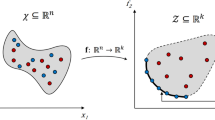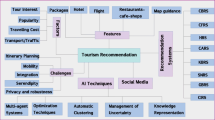Abstract
This study proposes a fuzzy and nonlinear programming approach for ubiquitous hotel recommendation. In the proposed approach, the weights of the attributes of a hotel differ among travelers, among locations, and over time. In addition, the weights assigned by a traveler are considered uncertain, and this uncertainty is resolved by defining these weights in fuzzy values. The overall performance of a hotel is then evaluated with the fuzzy weighted average of performance levels along all attribute dimensions. Subsequently, a nonlinear programming model is formulated and solved to derive the fuzzy values of weights that tailor the recommendation results to travelers’ choices. The proposed fuzzy and nonlinear programming approach was applied to a small region in the Seatwen District, Taichung City, Taiwan, and it satisfactorily explained travelers’ hotel choices in a ubiquitous environment.







Similar content being viewed by others
References
Chang PT, Hung KC (2005) Applying the fuzzy-weighted-average approach to evaluate network security systems. Comput Math Appl 49(11):1797–1814
Chen T (2015) An efficient and effective fuzzy collaborative intelligence approach for cycle time estimation in wafer fabrication. Int J Intell Syst 30:620–650
Chen T, Chiu M-C (2015) An improved fuzzy collaborative system for predicting the unit cost of a DRAM product. Int J Intell Syst 30:707–730
Chen T, Wang M-JJ (1995) Applying fuzzy set approach to signal detection theory. Fuzzy Sets Syst 72:39–49
Chen Y, Fung RY, Tang J (2006) Rating technical attributes in fuzzy QFD by integrating fuzzy weighted average method and fuzzy expected value operator. Eur J Oper Res 174(3):1553–1566
Chen Z, Xia JC, Irawan B, Caulfied C (2014) Development of location-based services for recommending departure stations to park and ride users. Transp Res Part C 48:256–268
Ding JF (2012) Using modified fuzzy perception-importance analysis to evaluate customer value for global shipping carrier-based logistics service providers. Inf Technol J 11(10):1434
Doctor F, Iqbal R, Naguib RNG (2014) A fuzzy ambient intelligent agents approach for monitoring disease progression of dementia patients. J Ambient Intell Humaniz Comput 5(1):147–158
Garbers J, Niemann M, Mochol M (2006) A personalized hotel selection engine. In: The 3rd European semantic web conference, pp 1–2
Gobin BA, Subramanian RK (2007) Knowledge modeling for a hotel recommendation system. World Acad Sci, Eng Technol 25:244–248
Guh YY, Hon CC, Wang KM, Lee ES (1996) Fuzzy weighted average: a max–min paired elimination method. Comput Math Appl 32(8):115–123
Huming G, Weili L (2010) A hotel recommendation system based on collaborative filtering and rankboost algorithm. In: 2010 second international conference on multimedia and information technology, pp 317–320
Kao C, Liu ST (1999) Competitiveness of manufacturing firms: an application of fuzzy weighted average. IEEE Trans Syst Man Cybern Part A Syst Hum 29(6):661–667
Kao C, Liu ST (2001) Fractional programming approach to fuzzy weighted average. Fuzzy Sets Syst 120(3):435–444
Levi A, Mokryn O, Diot C, Taft N (2012) Finding a needle in a haystack of reviews: cold start context-based hotel recommender system. In: Proceedings of the sixth ACM conference on recommender systems, pp 115–122
Lin C, Tan B, Hsieh PJ (2005) Application of the fuzzy weighted average in strategic portfolio management. Decis Sci 36(3):489–511
Liou TS, Wang MJJ (1992a) Fuzzy weighted average: an improved algorithm. Fuzzy Sets Syst 49(3):307–315
Liou TS, Wang MJJ (1992b) Ranking fuzzy numbers with integral value. Fuzzy Sets Syst 50(3):247–255
Liu F, Mendel JM (2008a) Aggregation using the fuzzy weighted average as computed by the Karnik-Mendel algorithms. IEEE Trans Fuzzy Syst 16(1):1–12
Liu F, Mendel JM (2008b) Aggregation using the fuzzy weighted average as compute d by the Karnik-Mendel algorithms. IEEE Trans Fuzzy Syst 16(1):1–12
Oliva G, Setola R, Barker K (2014) Fuzzy importance measures for ranking key interdependent sectors under uncertainty. IEEE Trans Reliab 63(1):42–57
Rinner C, Raubal M (2004) Personalized multi-criteria decision strategies in location based decision support. J Geogr Inf Sci 10:149–156
Srivastava V, Tripathi BK, Pathak VK (2014) Biometric recognition by hybridization of evolutionary fuzzy clustering with functional neural networks. J Ambient Intell Humaniz Comput 5(4):525–537
Tsai H-R, Chen T (2014) Enhancing the sustainability of a location-aware service through optimization. Sustainability 6:9441–9455
Vanegas LV, Labib AW (2001) Application of new fuzzy-weighted average (NFWA) method to engineering design evaluation. Int J Prod Res 39(6):1147–1162
Wang YM, Chin KS, Poon GKK, Yang JB (2009) Risk evaluation in failure mode and effects analysis using fuzzy weighted geometric mean. Expert Syst Appl 36(2):1195–1207
Wu H-C, Chen T (2015) CART–BPN approach for estimating cycle time in wafer fabrication. J Ambient Intell Humaniz Comput 6:57–67
Xiong Y, Geng L (2010) Personalized intelligent hotel recommendation system for online reservation: a perspective of product and user characteristics. In: International conference on management and service science, pp 1–5
Yu C-C, Chang H-P (2009) Personalized location-based recommendation services for tour planning in mobile tourism applications. Lect Notes Comput Sci 5692:38–49
Acknowledgments
This study is sponsored by Ministry of Science and Technology, Taiwan.
Author information
Authors and Affiliations
Corresponding author
Rights and permissions
About this article
Cite this article
Chen, T., Chuang, Y.H. Fuzzy and nonlinear programming approach for optimizing the performance of ubiquitous hotel recommendation. J Ambient Intell Human Comput 9, 275–284 (2018). https://doi.org/10.1007/s12652-015-0335-2
Received:
Accepted:
Published:
Issue Date:
DOI: https://doi.org/10.1007/s12652-015-0335-2




